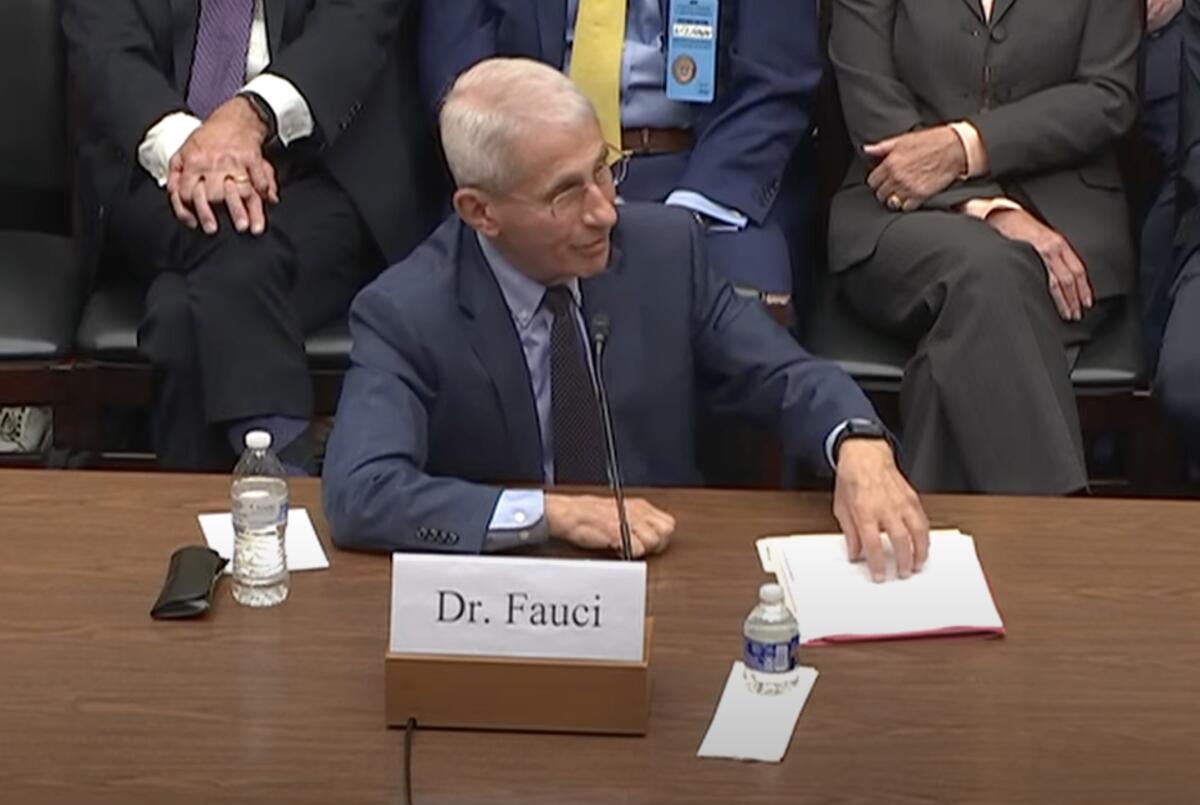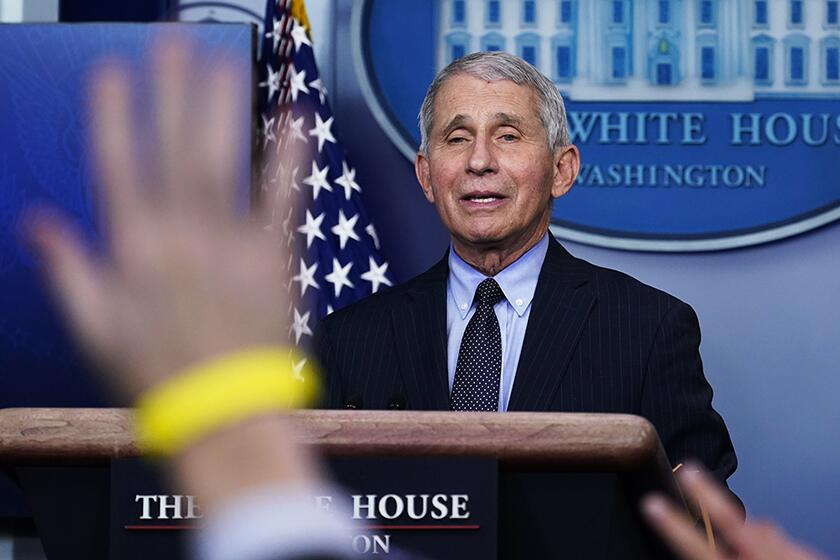Column: Anatomy of a smear — Fauci faces the House GOP’s clown show about COVID

Here’s what we know about Dr. Anthony S. Fauci: As a staff member at the National Institutes of Health for 54 years and director of its National Institute of Allergy and Infectious Diseases for 38 years, Fauci was a key figure in the development of therapies for HIV and ensuring that funding was available for the search for a cure.
Under his leadership, NIAID invested billions of dollars in research that resulted in the development of mRNA technology, which in turn resulted in the development of COVID-19 vaccines in record time, saving millions of lives.
Under Fauci, NIAID also sponsored research into treatments for pandemic flu and the Ebola and Zika viruses. When COVID struck, he was tapped as a top advisor to then-President Trump — one of seven presidents he has advised during his career, from Reagan through Biden.
There have been credible death threats leading to the arrests of two individuals, and ‘credible death threats’ means someone who clearly was on his way to kill me.
— Anthony S. Fauci
He’s revered in the communities of immunologists and virologists; even after Trump sidelined him because he was speaking truths about COVID that Trump didn’t like, he was a prominent spokesman for a scientific approach to the pandemic.
Here’s how he was depicted by Republicans during a hearing Monday of the GOP-dominated Select Subcommittee on the Coronavirus Pandemic: as the mastermind of “dogmatic” policies that resulted in school closings and business failures, of forced vaccinations, of “one of the most invasive regimes of domestic policy the U.S. has ever seen.”
Get the latest from Michael Hiltzik
Commentary on economics and more from a Pulitzer Prize winner.
You may occasionally receive promotional content from the Los Angeles Times.
As the financial sugar daddy of research overseas that created COVID. As the sponsor of policies that are “fundamentally un-American.” And as a liar and hypocrite.
None of those accusations, which were aired Monday by subcommittee Chairman Brad Wenstrup (R-Ohio) and other Republican members, has the slightest relationship with truth.
They’re all elements of a campaign among Republicans and right-wingers aimed at painting Fauci, 83, who retired from NIAID in December 2022, as “a comic-book supervillain,” in the words of Rep. Jamie Raskin (D-Md.).
Why are they doing this? One answer must be that conspiracists always need a target to attack in order to attract followers.
EcoHealth Alliance, which developed research allowing humankind to defeat the next viral pandemic, is officially cut off from federal funding. Democrats who connived with the GOP to do this should hang their heads in shame.
At the core of this campaign is the Republican conviction that COVID escaped from a Chinese laboratory.
Since there is absolutely no evidence for this theory that anyone has yet produced, Plan B has been to smear anyone in the firing line. Unfortunately for Fauci, he’s the designated “it.”
As I’ve reported many times, according to reputable scientists who have studied the origin of COVID, scientific evidence suggests that it’s overwhelmingly more likely that COVID reached humans the same way most viruses do, as spillovers from wildlife — in this case, via a thriving trade in China in animals susceptible to the virus.
Let’s look at the particular rabbit holes into which the subcommittee has burrowed to smear Fauci, as set forth during the 3½-hour congressional hearing Monday and in a 15-hour interrogation of Fauci by the subcommittee in January, a transcript of which was released over the weekend along with a memo that misrepresented and cherry-picked his answers.
The committee members are fixated on the notion that Fauci “suppressed” discussion of the possibility of a lab leak. Why would he do that? Rep. Ronny Jackson (R-Texas) proposed an answer.
“It’s obvious to everyone,” he said, “that you and your organization, NIH, had a lot to lose if the American people were to discover that COVID-19 most likely leaked from a lab in Wuhan, China, and that you ... actually funded this research.”
The problem there is that, first, Fauci has to this day stated that he is open-minded about the origin of the pandemic.
More to the point, documentary evidence in the subcommittee’s possession shows that in the early days of the pandemic — January and February 2020, when scientists saw features of the SARS-CoV-2 virus causing COVID that they didn’t recognize as coming from nature — he urged them by email to report their concerns, if validated, to “the appropriate authorities,” meaning the FBI in the U.S. and MI5 in Britain.
“It is inconceivable,” Fauci said in his opening statement to the subcommittee, “that anyone who reads this e-mail could conclude that I was trying to ‘cover up’ the possibility of a laboratory leak. I was advocating for a prompt and thorough examination of the data and a totally transparent process.”
Richard Ebright and Bryce Nickels of Rutgers have labeled leading virologists fraudsters, perjurers, felons and murderers. Is this how scientific debate is supposed to be conducted?
As it happened, further scientific scrutiny convinced the scientists that “any type of laboratory-based scenario” was not “plausible,” as they reported in Nature in March 2020. Their conclusion has held up over time.
The subcommittee Republicans tried hard to contradict the notion that the lab leak hypothesis is a “conspiracy theory.” Fauci played along, up to a point. He acknowledged that speculation about a lab leak is not in itself a conspiracy theory, but that doesn’t go for the elaborations that many of its adherents have made of it.
“What is a conspiracy theory is the kind of distortions of that particular subject, like, it was a lab leak and I was parachuted into the CIA like Jason Bourne and told the CIA that they should really not be talking about a lab leak,” he said. “That’s a conspiracy.” He was referring to a ludicrous accusation published in September, with great fanfare but no factual support whatsoever, by none other than Wenstrup.
The members spent an inordinate amount of time Monday on the question of whether Fauci’s institute funded so-called Gain of Function experiments in China, so a brief primer on this issue is in order.
“Gain of Function” has become something of a shibboleth for lab-leak adherents, the way “critical race theory” and ESG have become dog whistles for activists trying to undermine, respectively, the public educational system and environmental and social concerns for investors — in this case, giving the term a uniquely sinister connotation.
Generically, however, it refers to laboratory work that augments natural qualities of a microbe to facilitate experimental scrutiny or achieve a necessary goal, such as allowing microbes to produce a flu vaccine or bacteria to produce artificial insulin.
From 2014 to 2017, the U.S. suspended gain-of-function experiments to develop a standard identifying research that might produce “potential pandemic pathogens.” The lab-leak camp asserts that NIAID funded experiments that gave a virus in the Chinese lab the features necessary to make it infectious for humans.
The work that NIAID funded in China was analyzed according to that standard, and it was determined by NIH not to fall into that category, as Fauci has testified before. The subcommittee peppered Fauci with questions aimed at eliciting an admission that the NIAID-funded work qualified under the broad, pre-2017 definition, but he made clear — and is supported by the public record — that the work did not fall into that category.
Much of the hearing was devoted to trivialities. The Republicans blamed Fauci for imposing a regulation on Americans specifying that effective social distancing required a six-foot space between individuals. The GOP members maintain that no scientific research validates a six-foot standard, and cited a 2020 peer-reviewed paper as confirmation.
Johns Hopkins, Yale and others are offering scientists and physicians guides for addressing misinformation and disinformation. It’s an uphill battle.
This assertion is self-refuting, however; the paper actually says that under some circumstances, six feet may not be enough. When Fauci was asked about the issue in January, he explained that coughing, sneezing, wind and other conditions could play into the efficacy of social distancing at any distance. At that point his questioner, GOP counsel Mitch Benzine, acknowledged, “I didn’t think that through, I guess.” But the Republicans masticated the issue endlessly Monday nonetheless.
In any case, Fauci never had the authority to impose public health mandates — whether for masks, social distancing, vaccination or anything else. These were a product of state and local policy decisions. To the extent they relied on government recommendations, those came from the Centers for Disease Control and Prevention, a government body with which Fauci had no official connection.
The fundamental theme of Monday’s hearing was that Fauci should be blamed, even pilloried, for doing the best anyone could in dealing with a virus that no one had seen before, with means of transmission that were not understood for months or more and therapies that took more than a year to figure out.
It’s Fauci’s burden that ignorant and irresponsible politicians and their followers have chosen to turn their gunsights on him, for reasons that remain unclear.
“There have been everything from harassments by emails, texts, letters, of myself, my wife, my three daughters,” he said. “There have been credible death threats leading to the arrests of two individuals, and ‘credible death threats’ means someone who clearly was on his way to kill me. It’s required my having protective services essentially all the time.”
Is this how we wish to treat our most devoted public servants — by smearing them to the point that promising scientists choose not to place themselves in the firing line by entering the public health field?
At the close of the hearing, Wenstrup said his panel’s “goal is to take a hard look at the facts.” But there were few “facts” elicited Monday, just disinformation and character assassination.
Was that really the goal? There are no signs that the Republicans learned a thing from their 3½-hour inquisition. In January, during Fauci’s interrogation, Rep. Michael Cloud (R-Texas) tweeted, “While many lost their loved ones, their businesses, and livelihoods, Dr. Fauci made millions and enjoyed the media spotlight. It was his most successful year.”
Monday, I asked Cloud if he still believed that. He replied, “I 100% stand by this tweet. Dr. Fauci received more money and glowing media coverage than he had ever received in his life, and if you can’t pick up that he both enjoyed it (and fed into it), then that is on you.”
Let’s give Fauci the last word on that. In January, he lamented that in 2020 he “became the villain number one of the extremists in the population,” which made it “one of the worst years of my life.” Shown the tweet, he asked, “A congressman tweeted that?”
He was told, “Yeah.”
He replied, simply, “Jesus.”
Get the latest from Michael Hiltzik
Commentary on economics and more from a Pulitzer Prize winner.
You may occasionally receive promotional content from the Los Angeles Times.











